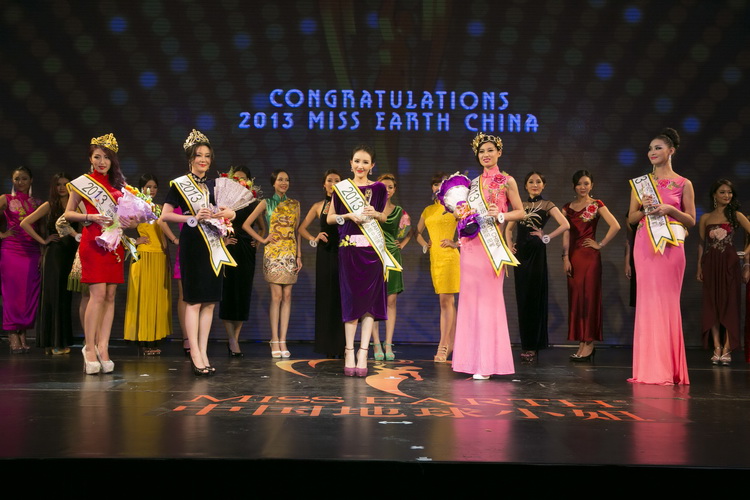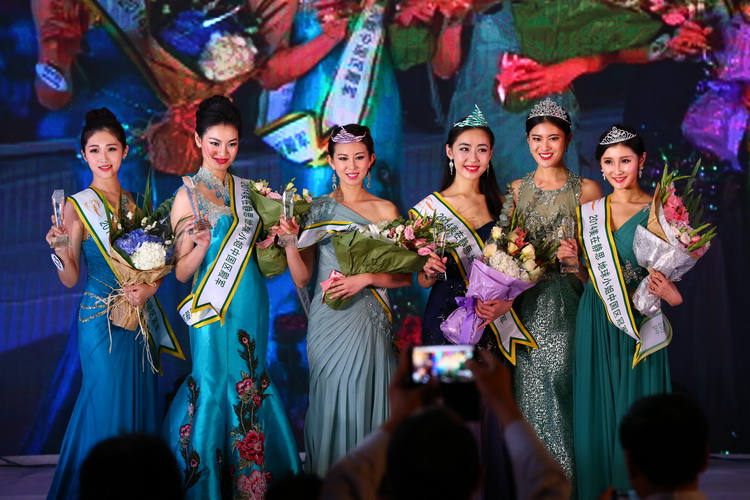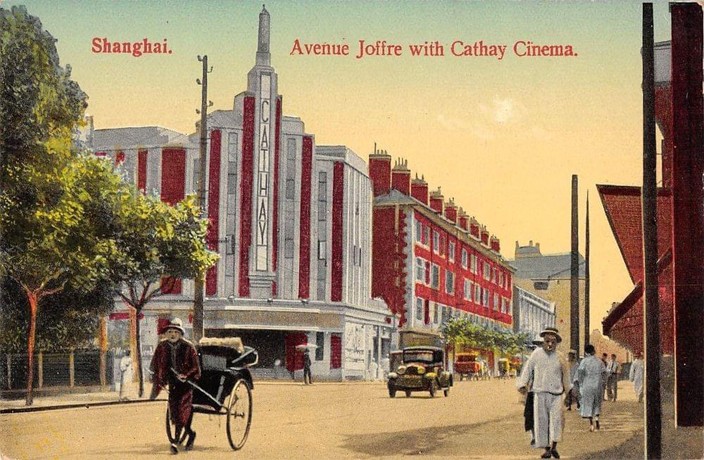In the world of Chinese pageantry, the word ‘amazing’ gets repeated a lot. The contestants are amazing. The opportunities generated by the event are amazing. The sponsors are amazing. The people in the room are amazing. Even opponents and critics (of which there are surprisingly few) are amazing.
“We are here today because we hope we can start something together – something amazing,” says Michael Rosenthal, using the word, again, for the umpteenth time. American-born Rosenthal, who is the national president of the Miss Earth pageant, is today hosting a ‘VIP luncheon’ in Zhangjiang, on the outskirts of Shanghai, to promote an upcoming competition to be held in the city later this summer.
From here on, the word ‘amazing’ gets repeated a lot. The contestants are amazing. The opportunities coming from this event are amazing.
“This is a pageant with a difference. It’s a platform for women to learn about charities, culture and other issues. We did a tree planting last week – and have a bike ride planned next week. We want you and your companies to be part of this amazing event.”

A murmur of agreement passes through the varied – and slightly random – group of potential investors assembled around the table. “We will show you the value we can offer you. Our sponsors are very dear to us. You will be more than just a logo.”
Beauty pageants such as Miss Earth, might appear all smiles, swimsuits and tiaras, but they require money, investment – and, in China, a significant amount of guanxi (social capital). For those able to secure the necessary deals – and navigate the often corrupt network of business interests that underlie that process – the financial rewards can be huge.
Last year, there were over 300 pageants held throughout China. Equal to almost one pageant a day. Titles ranged from Miss Bikini of the Universe and Miss Famous Model of China, to Miss Beautiful Fairy and Miss International Coconut Festival.

Though contests rarely charge applicants – legitimate contests never do – the likes of Miss Long Leg and Miss Honest Smile often require hefty participant ‘enrolment fees’ – that can run into the tens of thousands.
As with beauty contests worldwide, girls who apply are seeking fame, the opportunity to launch a career in television (many former beauty queens in China go on to become TV presenters or anchorwomen), or the chance to receive free professional training (international pageants often offer month-long courses in the run-up to the finale including etiquette, fitness, psychology sessions and makeup). Some have ‘benefactors’ who want to push them in the entertainment industry. Some aim to go international. Others meanwhile, are in it as part of a fixed setup, where winners are cast long before the actual final.

Mike Bai, a onetime pageant insider, who asked us not to reveal the name of his former company, believes that the pursuit of beauty – and the girls themselves – are merely a front, for what in reality is a complex web of mutual business interests. “The profit margin on a single event is normally between 30 to 35 percent of total sponsorship. Companies that hold contests also have a slew of other deals and ventures going on the side. Pageants just offer the chance to build contacts for those activities, particularly in China,” explains Bai.
Things have come so far that having legitimacy doesn’t even matter anymore. Any title goes.
“It’s a big self-promoting scheme. The individuals or companies behind the pageants are in it mostly to boost their names or brands. Most pageants are massively corrupt – especially the smaller ones.”

Inevitably, smaller pageants tend to take place away from the glare of the central government in smaller second- and third-tier cities. “People who organize beauty pageants in provincial towns and cities are well recognized members of their business community. They have relations with the government, with media, they interact with police and mafia. They are hustlers. And they organize contests because they have this network and want to use it for their own purposes. The money they make from sponsorships and such goes mostly into their pockets, not to the event itself.”
A key means of generating sponsorship in is to register your own organizations abroad, or buy the franchise for international contests, explains Bai. “That way, you can be identified as a ‘world-class event.’”
Franchise contracts typically run for three to five years, with each beauty contest holder required to pay back annual fees to the ‘mother’ brand. Many Chinese pageant companies, however, do so by sub-franchising the name to other smaller business in places such as Anhui or Liaoning. These, in turn, further sub-franchise by city, prefecture or school. Hence the mushrooming of ‘Misses’ across the country.
“There is no real supervision in China,” says Bai. “Meaning more and more organizations are claiming the rights to ‘global’ contests, even though they don’t have any. It's completely chaotic. Things have come so far that having legitimacy doesn’t even matter anymore. Any title goes. And the scheme goes on.”

Dr. Liu Jieyu, Deputy Director of SOAS (School of Oriental and African Studies) China Institute in London, who has monitored the rise of pageantry in China, views beauty contests as a natural continuation of the country’s economic reforms. “The Post-Mao era saw a rejection of the practice of erasing gender differences that had characterized the Cultural Revolution,” says Dr. Liu.
“Pageantry and Western approaches to femininity became quite enticing as a way to ‘re-sexualize’ women, and offer them a chance for glamour and wealth. Local governments, on their part, began embracing the idea of using beauty to promote tourism and foster opportunities for Chinese and overseas businesses.”
People who organize beauty pageants in second-tier cities are hustlers.
The town of Xitang, in Zhejiang Province, saw its tourism revenue quadruple after it held the China finals for the Miss World Tourism pageant in 2004, 2005 and 2006. The local government invested some RMB3.5 million a year to organize the event, while the increase in local tourism income was thought to exceed several hundred million yuan. Similarly, since hosting Miss World, Sanya has seen a dramatic increase in its tourist numbers, comfortably recouping the millions spent by local authorities on paving roads and building facilities for the event.

The idea of bikini-clad contestants didn't immediately take off, however. In 1993,when the Miss World beauty pageant was commanding 1.8 billion viewers worldwide, the front page of the state-run Beijing Youth Daily published an article titled "Peking University women reject beauty pageants.” The piece slammed beauty contests as objectifying women and received widespread support from readers.
“People born in the 50s were skeptical about the format of these competitions at first,” says Dr. Liu. “But sure enough, China has been quick to adapt its outlook.”
Today, it’s not just merely a swimwear parade followed by a gown number and a Q&A session. Depending on the pageant, and on the network the promoters want to reach, girls are required to strut up a mountain wearing nothing but a bikini, show off their talents with dancing or singing routines, or wear fairy costumes referencing Chinese folklore tales.

Each competition strives to stand out in different ways. Miss Earth China, which was first launched in 2002 – former attorney turned pageant director – Rosenthal bought the franchise in 2013 – differentiates itself by organizing year-long events that span charity, voluntary work and environmental initiatives.
Participants don’t have to be models, just “slightly above average,” claims Rosenthal. In Zhangjiang, where he’s running the contest on a local level, the organization has teamed up with a local business park to get young women from companies like HP or General Electrics to enter.
By the end of the year, a final show is held in Shanghai, and the national winner named. The victory means a chance to represent China at the international contest for Miss Earth.
Despite the pageant’s positive social message, none of the projects these girls participate in influences their final score, however. Who gets the crown is decided on the closing night, like any other beauty contest. And, as any other beauty contest, a bikini performance is a must.

It’s hard to see a connection between saving trees and flaunting a swimsuit in front of an audience, but Rosenthal says the “bikini section is part of the arrangement. It’s in the contract I signed with Miss Earth, and there’s nothing I can do about it.”
For some of the contestants, the mandatory section isn’t such a big deal. Former contestant Xie Yi, tells me that she doesn’t mind the bikini part, “You’ve got to go into the competition with the right mind set. It's about beauty and you have to show what beauty is.”
Others, however, aren’t exactly comfortable with the idea. Xiang Yang, who goes by the English name of Lisa and was the winner of Miss Earth China 2013, and is now helping to promote the event alongside Rosenthal, tells me that she found the idea of wearing a swimsuit upsetting.“Even now, I don’t like thinking about it. But there’s nothing I could have done – it’s part of the competition and you have to follow the rules if you want a chance to win.”
When I ask both girls what made them decide to enter the pageant, I get pretty much the same answer. “Miss Earth isn’t just about beauty,” says Xiang. “It includes a lot of responsibilities and communication skills. It’s a great platform.”
Xie Yi agrees. “I like the environmental side of it, and how involved we are in the local community.”
Maybe they are sincere. Maybe they do think the pageant isn’t just about looks and beauty. But their enthusiasm feels a little acted, as if they are reciting lines by heart. And I still don’t see how the bikini fits with the whole “let’s save the planet” message.
If the whole thing is just a big marketing stunt, what’s really in it for them?
“Amazing training, amazing networking, amazing time with other girls,” says Rosenthal. “Beauty is a primordial instinct. And we are feeding it through them. It’s an amazing opportunity.”
Xiang agrees. “More and more Chinese girls are confident enough to show themselves off now, and they’re getting more active and open-minded. Beauty pageants offer a way to shine,” she explains. “Of course there’s the issue of objectifying women. But as society develops, I believe we’re going to play a bigger role in it and be worth of greater respect. Plus everyone likes watching pretty girls – myself included.”
// Additional research by Tongfei Zhang























0 User Comments